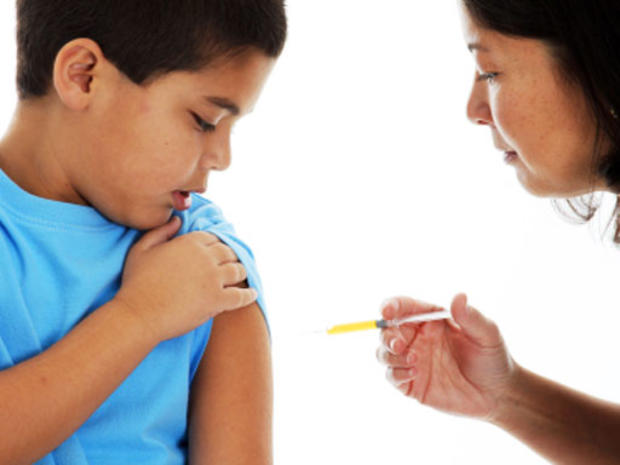Chemicals found in microwave popcorn bags may interfere with vaccine protection
(CBS) Can microwave popcorn mess with childhood vaccinations? The two may seem completely unrelated, but a new study suggests chemicals that are widely used for making popcorn bags and lots of other products may counter the immune system benefits from vaccines in kids.
PICTURES - 12 myths and facts about vaccines
The chemicals in question are called perfluorinated compounds (PFCs). The compounds are found in household items such as food packaging, stain repellents, and non-stick coating in pots and pans. The compounds don't break down easily and are often found in the environment and wildlife. Previous studies in mice found that high PFC concentrations could be toxic for a mouse's bloodstream and immune system.
How about in humans? To find out, Harvard researchers investigated whether high PFC levels would interfere with children's antibody responses to diphtheria and tetanus vaccines. The researchers chose 656 children who lived in the Faroe Islands (located between Iceland and Scotland) to gauge the impact of PFCs, because previous research suggests people who eat lots of marine foods have higher exposure to PFCs.
The researchers found that a doubling of PFC levels in a mom's bloodstream during pregnancy corresponded with a 39 percent drop in diphtheria antibody protection when the child was 5 years old. When the children themselves were tested in 2008, the researchers found a doubling of a child's PFC levels corresponded with a child being two to four times more likely to have an immune response considered too low to be clinically effective.
"We were kind of shocked when we saw those numbers," study author Dr. Philippe Grandjean, adjunct professor of environmental health at the Harvard School of Public Health in Boston told Time Healthland. "This is the first study to say that by [exposing children to these chemicals], we are screwing up a major aspect of disease prevention in our society. I've been in the field for quite a while, and this is a very strong signal."
The study was published in the Jan. 24 issue of the Journal of the American Medical Association.
Grandjean told WebMDthat the immune system "may become sluggish because of the PFCs."
What should people do to reduce their PFC exposure?
Grandjean said he couldn't give advice with certainty since the mechanism of how PFCs actually enter a child's bloodstream is unclear, but he recommends people avoid microwave popcorn, lubricants for skis and snowboards, and furniture, carpet, shoes, and clothes that treated with stain repellents.
"I don't feel comfortable with the compounds for myself and my family and would rather eliminate them," he told Reuters.
Not all experts were swayed by the study. Dr. Anthony Dayan, an independent toxicologist who has worked as an industry advisor, told Reuters, "The study proves nothing" because it didn't account for other considerations, such as how compounds in oily fish called polyunsaturated fatty acids may also suppress the immune system.
Dr. Gilbert Ross, medical director of the American Council on Science and Health, a nonprofit funded by corporations and individuals, had harsh take on the study.
"Absolute junk," Ross told WebMD. He says no studies have found increased rates of tetanus or diphtheria among people with higher PFC concentrations in their bodies. "It appears to represent this group's attempt to link PFCs to some adverse health effect." The study ''no clinical significance whatsoever."


